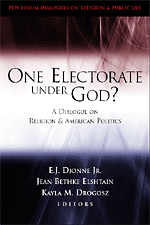
|
Posted September 24, 2004 Book: One Electorate Under God? A Dialogue on Religion and American Politics Editors: E.J. Dionne Jr., Jean Bethke Elshtain, Kayla M. Drogosz Brookings Institute Press, Washington, D.C., pp. 239
Like Bill Clinton and Jimmy Carter before him, George W. Bush has included in his speeches references to his religious beliefs. During a presidential debate in 2000 he identified Jesus as the greatest influence on his political philosophy. “When you accept Christ as savior,” he said, “it changes your heart — it changes your life.” Declarations of faith by our presidents have engendered little controversy, nor should they. What has prompted debate is the question of how religious convictions and sensibilities should relate to the obligations of public office in a political system that insists on the separation of church and state. This book is intended as a contribution to that debate. An Excerpt from the Book: The twentieth century’s premier Western intellectual defender of pluralism, the late Oxford don Sir Isaiah Berlin, once quipped that there is no reason for supposing that the truth, once it is discovered, will necessarily prove interesting. The truth about so-called faith-based initiatives is not very interesting and would, in fact, be a dreadful bore were it not for the fact that orthodox sectarians, orthodox secularists, and their respective allies in the media and other places continue to distort, deride, or simply ignore it. Let us begin with the historical truth, namely, that for all the secular sound and sectarian fury about religion’s role in the public square, for all the ink spilled and voices raised, thee is broad bipartisan consensus, buoyed by mass public approval and backed by federal laws and court decisions, favoring public-private, religious-secular partnerships that serve people in need. On May 24, 1999, Democratic presidential candidate Al Gore, speaking at a Salvation Army drug treatment center in Atlanta, declared that our “severest challenges are not just material, but spiritual.” Noting that “freedom of religion need not mean freedom from religion,” he praised faith-based groups that “nationwide have shown a muscular commitment to facing down poverty, drug addition, domestic violence, and homelessness. When these community-serving groups “have worked out a partnership with government,” he said, “they have woven a resilient web of life support under the most helpless among us.” Table of Contents: How would God Vote? An Introduction E.J. Dionne Jr. and Kayla M. Drogosz Part I Faith and Politics in Public Office In the American Catholic tradition of realism Mario Cuomo A Conservative Christian’s view on public life Mark Souder Continuing the Conversation Discussions by: Doug Bandow Michael Barone Gary L. Bauer Paul E. Begala Robert Bellah David Brooks Harvey Cox Michael Cromartie John J. DiIulio, Jr. Terry Eastland Jean Bethke Elshtain Richard Wightman Fox Robert P. George Andrew Greeley John C. Green Anna Greenberg Susannah Heschel Amory Houghton Jr. Michael Kazin M.A. Muqtedar Khan Glenn C. Loury Martha Minow Stephen V. Monsma Mark A. Noll David Novak Ramesh Ponnuru David E. Price Jeffrey Rosen Cheryl J. Sanders Julie A. Segal James W. Skillen Matthew Spalding Jeffrey Stout Roberto Suro John Sweeney W. Douglas Tanner Jr. Jim Towey Mark R. Warren Alan Wolfe |
|
